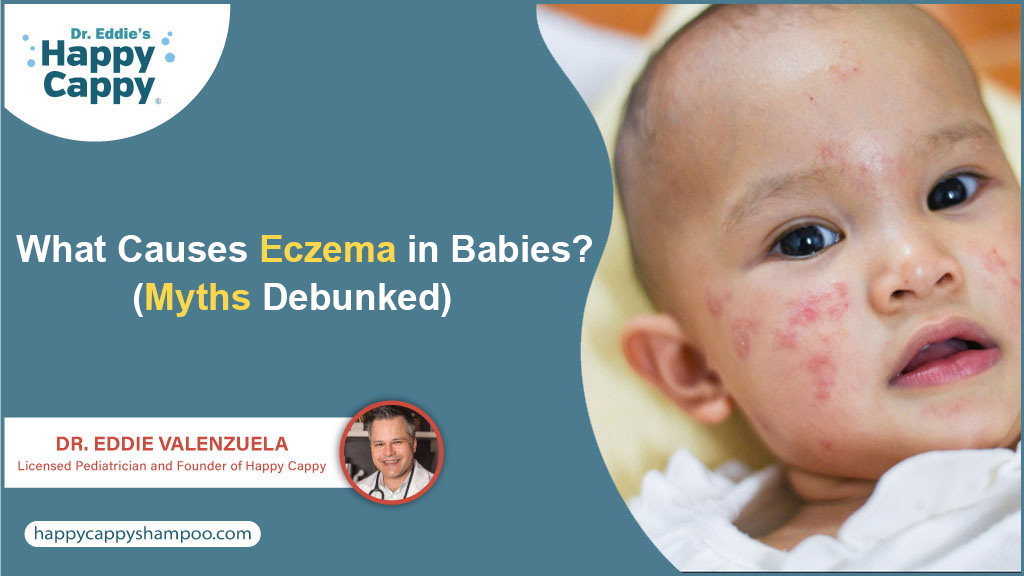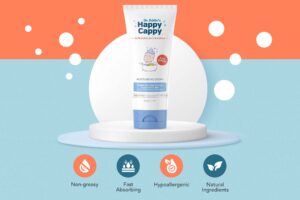
Your bundle of joy at 3 months old suddenly starts developing red crusty cheeks. Your 1-year-old has itchy, crusty, red folds on the elbows and behind the knees. What’s going on? These are the symptoms of eczema–also called atopic dermatitis.
What Is Eczema?
Eczema is an inflammatory skin condition in babies that causes their skin to become dry, itchy, and scaly. Eczema is more common in babies than it is in adults. According to the National Eczema Association, around 31 million US citizens experience eczema and most of them develop it in the first 5 years of their life.
Eczema in babies usually first appears as red rashes on their cheeks and then appears on other parts of the body. This may make you wonder–is eczema contagious? The answer is no, it is not contagious, and it won’t spread to other babies.
Eczema Symptoms in Babies
Some of the common symptoms of eczema experienced by babies, teenagers, and adults are:
- Itchy skin
- Dry skin
- Inflammation
- Discoloration of skin
- Red rashes
- Small bumps that may ooze
This flaky, itchy, scaly, irritated condition occurs in different characteristic locations at different ages.
Eczema in Babies
Babies mostly develop it on their
- Cheeks
- Forehead
- Around the mouth
- Elbow
- Knees
- Eyelids
Eczema in Toddlers
Toddlers mostly experience it on
- Inside of elbows
- Back of knees
- Face
- Neck
Causes of Eczema in Babies
There is no one solitary cause for eczema. It is believed to be caused by a combination of factors such as
Skin Barrier Dysfunction
There are many, many components of the skin barrier. One of the most studied is Filaggrin. This protein and its derivatives help make what is called Natural Moisturizing Factor (NMF).
Loss of filaggrin can lead to a poorly formed stratum corneum (top layer of skin), and make the skin prone to water loss.
If the skin barrier is not fortified appropriately, any environmental substance can begin to trigger abnormal immune responses. People with Filaggrin mutations may have eczema develop at a young age.
Genetics
About 70% of children with eczema have a family history of eczema, asthma, or allergic conditions. Sometimes doctors lump these 3 conditions together and call this atopic disease or atopy.
If you have one parent with eczema, asthma, or allergies there is a 2 to 3-fold higher chance that a child will develop eczema. If you are reading this and both you and your spouse have eczema, asthma, or allergies there is a 3 to 5-fold chance that your child will develop atopic dermatitis.
Immune System
An overactive immune system can trigger the development of eczema. When the immune system is overactive it considers outside allergens and irritants that may not be harmful as dangerous for the skin.
As a reaction to these allergens, the immune system releases certain types of cells that try to protect the skin and in the process of doing so they cause inflammation. This inflammation under the skin leads to what a person experiences as irritation, itching, and redness–the most common symptoms of eczema. The most common type of eczema caused by the immune system is called contact dermatitis.
Environmental Factors
There are various environmental factors that can trigger eczema or an eczema flare-up. Some of the most common factors that can cause eczema in babies are mentioned below.
Common Triggers of Baby Eczema
According to the American Academy of Dermatology, some common triggers found inside or outside the house or on the baby’s body are
- Dry skin
- Extreme climate
- Sweating
- Dust mites
- Pet dander
- Tobacco smoke
- Irritating clothes
- Allergic food
- Saliva
- Pollen
- Pollution
- Sunburn
- Harsh chemicals in baby skincare products
- Laundry detergents and fabric softeners
Myths About Causes of Eczema
-
Mother’s Diet and Eczema in Babies
The American Academy of Pediatrics (AAP) released a new report in 2019 addressing what we know about what causes eczema in infants. “Current evidence does not support a role for maternal dietary restrictions during pregnancy or lactation”. In fact, trying to restrict foods like eggs or milk may lead to a baby with a lower fetal weight gain in pregnancy.
-
Breastfeed and Formula Milk
The clinical report by the AAP goes on to talk about the benefits of exclusive breastfeeding for 3 to 4 months, saying it decreases the incidence of eczema in the first 2 years of life.
There was a time when we thought giving extensively hydrolyzed formulas could prevent eczema, but it looks like there is now a lack of evidence to make this claim. Extensively hydrolyzed formulas are used in kids who have milk protein allergy and can run double the price of regular formula. So when considering what causes eczema in babies we can now utilize regular formula and rest assured we are not contributing to eczema.
-
Allergenic Foods
For decades, we as pediatricians used to say that we should avoid giving kids eggs until age 2 years old and seafood and peanuts until age 3 years old but now we no longer think this is the case.
There is no evidence that delaying the introduction of allergenic foods, including peanuts, eggs, and fish, beyond 4 to 6 months of age prevents atopic disease, and in fact, the new thought in pediatrics is that early introduction of peanuts may prevent peanut allergy. We advise consulting your pediatrician about these sorts of feeding issues.
Hygiene Hypothesis and Eczema
In the late 1980s, people began to discuss the “hygiene hypothesis.” It was suggested that less exposure to germs led to not allowing the immune system to mature adequately. So, the cleaner things were kept for young children in Western cultures, the more chances that a child will get asthma, allergies, and eczema.
There are now almost 30 years of studies looking at environmental exposure to germs at a young age and how it may help reduce the chances of being affected by atopic dermatitis. Specifically, studies show that kids who attend daycare at an early age, and farm kids who are exposed to benign germs from livestock may have less eczema.
How to Treat Eczema in Babies?
There is no permanent cure for eczema however it can easily be managed by following a few simple steps and taking proper care of the skin. Make sure you incorporate the following in your baby’s daily skincare routine.
Eczema Shampoo
- Wash your baby’s skin daily with a baby eczema shampoo and body wash.
- Use lukewarm water to bathe them.
- After bathing or washing, pat dry their skin.
An eczema cleanser will not only help clean the skin but also help in soothing the redness, irritation, and itching. Make sure that you choose the right eczema shampoo and cleanser for your baby.
Look for a cleanser that is specially formulated for the baby’s delicate and sensitive skin. The best baby wash for eczema is the one that is free from any type of irritant such as parabens, fragrance, sulfate, and alcohol.
Eczema Cream

Keep your baby’s skin moisturized at all times because dry skin can further exacerbate eczema.
- Moisturize their skin at least twice daily with a baby eczema cream.
- Immediately after bathing your baby, moisturize their skin while it’s still a little damp.
- You can also moisturize the baby’s skin more than twice daily if it becomes dry more often.
- Choose an eczema cream that contains natural ingredients like licorice root extract, it helps in soothing irritation and itching.
Preventing Eczema Flare-up
Even though you can not completely prevent eczema there are a few things that you can do to reduce the chances of future eczema flare-ups.
- Keep your baby’s skin moisturized even when they are not experiencing eczema.
- Avoid extreme heat and sweating.
- Prevent the air in your home from becoming dry with the help of a humidifier.
- The baby products that you use on your baby’s skin should be free from fragrance, alcohol, parabens, sulfate, and artificial dyes.
- Use breathable fabric for your baby’s clothes to prevent sweating.
- Use gentle laundry detergent for washing the baby’s clothes and bedding.
- If your baby’s eczema is caused due to an irritant or allergen try keeping the baby away from them.
- Keep the baby’s nails short to prevent intense scratching.
Consult a Doctor
If your baby’s eczema is not getting better or getting worse even after taking proper care then it is best to consult a doctor. There are chances that your baby may be experiencing any other similar skin condition such as psoriasis.
If your baby is experiencing severe eczema then a doctor may prescribe the use of topical steroids to alleviate their symptoms.
If you are looking for eczema products for your baby or yourself, try out Happy Cappy Eczema Skincare Solution. It contains a daily eczema shampoo and an eczema moisturizing cream. These products are dermatologist-tested, free from irritants, and are specially formulated for sensitive skin, dry skin, and eczema-prone skin.
FAQs
What does baby eczema look like?
Eczema in babies usually appears as red, itchy, and dry skin patches. But it may appear differently in every baby. On lighter skin tones, it may appear as a red or pink rash; darker skin tones may appear as purple or brownish patches.
At what age a baby can experience eczema?
There is no specific age for eczema to appear. It can appear at any age, from the first month after birth to the first birthday, a baby can develop eczema at any age.
Is baby eczema genetic?
Yes, genetics can play an essential role in developing eczema. Babies who have a family history of eczema, asthma, and allergies are more prone to developing eczema at an early age.
What are the different types of eczema in babies?
The four most common types of eczema found in babies are atopic dermatitis, contact dermatitis, seborrheic dermatitis, and rarely dyshidrotic eczema.
Can formula milk cause eczema in babies?
If your baby is allergic to milk protein, then there are chances that formula milk may trigger eczema. If you suspect that your baby is allergic to formula milk, then it is best to consult the doctor as they may prescribe hypoallergenic formula milk.
